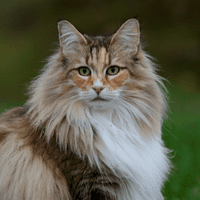Did you know that cats are considered seniors at age 11? These days, many kitties are living well into their teens or even 20’s with good care. However, it’s important to know whether your feline buddy is aging in a healthy way, or if she may be developing health issues that need to be addressed. Keeping up with Fluffy’s veterinary appointments is of course crucial here, but there are also things to be on the lookout for at home. An Aurora, CO vet lists some of the key ones below.
Physical Changes
Cats experience many of the same types of changes that people do as they age. Fluffy’s fur may get thin, and her skin may get a bit dry or scaly. You may also notice her whiskers turning darker. As far as body composition, it’s normal for aging pets to have some loss of muscle mass, though this shouldn’t be too drastic. Many kitties also develop vision issues, so Fluffy’s eyes may seem grey and cloudy. You might also notice her claws getting thicker, and her teeth looking glassy or yellow.
Activity
Fluffy won’t be as active as she once was, but she should still be somewhat playful. She should also be able to jump, though maybe not as high as she used to. Your furry pal will also manage to sleep even more than she used to, and may just become less active overall.
Behavior
Every cat ages a little differently, but there are some common things to look for as far as behavior. Fluffy may change her schedule a bit. Sometimes senior kitties get confused, and meow their distress. You may notice changes in your furball’s vocalizations. Your feline friend may also become stressed more easily, especially by things like car rides or major household changes.
Cognitive Decline
There is a pattern of signs that is used to monitor cognitive decline in dogs, which also works for cats. The acronym here is DISHA. That stands for Disorientation, Interaction changes, Sleep/Wake Disturbances, House Soiling, and Activity. Disorientation may manifest as Fluffy getting lost going to her litterbox. Interaction changes could encompass things like withdrawal or antisocial behavior, while Sleep/wake disturbances may play out as changes in sleeping habits. Ask your vet for more information on this.
Do you have questions about senior cat care? Contact us, your Aurora, CO animal hospital, today.







